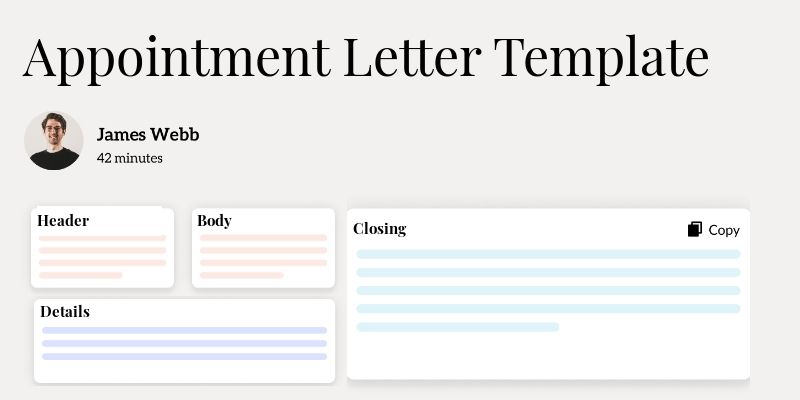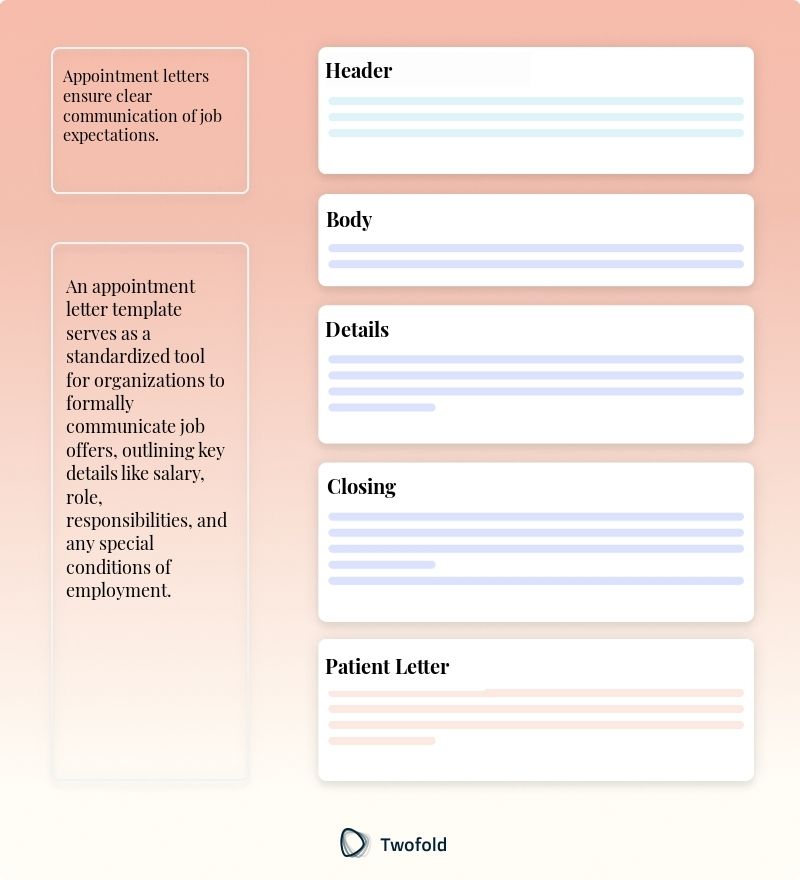
Appointment Letter Template
Appointments are a crucial part of healthcare management, but arranging them can often be stressful. Imagine having all the critical information your patients need laid out in a clear, accessible format. That’s where an Appointment Letter Template can make life easier. If you're weary of the back‑and‑forth communication to confirm details, read on to discover the perfect solution for streamlining this process.
What Is an Appointment Letter Template?
An Appointment Letter Template is a standardized document used by healthcare providers to formally schedule and confirm patient appointments. It serves as a communication tool to convey necessary details about the appointment to the patient, ensuring both parties are aligned.
This template includes essential information such as the date, time, and location of the appointment, and it can be adapted to include additional details specific to the practice's needs. Its primary purpose is to provide clarity and structure, reducing the potential for miscommunication.
Key Components of an Appointment Letter
A well‑structured Appointment Letter Template should include the following components:
- Header with healthcare provider's details
- Patient's contact information
- Date and time of the appointment
- Location of the appointment including any special instructions for finding the office
- Purpose of the appointment and any preparation instructions
- Contact information for rescheduling or inquiries
- Legal disclaimers and patient privacy information

How to Use an Appointment Letter Template: Step-by-Step Process
Step 1: Gather Patient Information
Collect all necessary patient details such as contact information, preferred appointment times, and any specific needs or accommodations.
Step 2: Fill Out Template Details
Input the patient details into the template, ensuring accuracy in the date, time, and location sections, as well as any instructions or requirements relevant to the appointment.
Step 3: Customize as Needed
Adjust the language and layout to suit specific appointments, adding any additional notes pertinent to the patient's visit that might enhance understanding.
Step 4: Review and Send
Check for errors or omissions before mailing or emailing the letter to the patient, ensuring all details are correct and clearly presented.
Benefits of an Appointment Letter
Benefit | Explanation |
|---|---|
Enhanced Communication | Ensures patients receive all necessary appointment details in an easily understandable format, reducing miscommunication. |
Time Efficiency | Saves staff time by standardizing the appointment scheduling process. |
Reduced Errors | Pre-formatted fields minimize the risk of mistakes in the details communicated to patients. |
Improved Patient Satisfaction | Patients appreciate efficient and clear communication, enhancing their overall experience at the practice. |
Stakeholders in Appointment Letters
Several stakeholders benefit from well‑crafted Appointment Letter Templates, each with unique interests and perspectives:
- Patients: For example, Sarah, a patient undergoing regular check-ups, appreciates receiving clear instructions about her quarterly appointments.
- Healthcare Providers: Dr. James, a busy GP, finds that templates help reduce administrative errors, enabling more focus on patient care.
- Administrative Staff: Jane, a clinic administrator, uses templates to quickly send out consistent and clear appointment information.
- Family Members: Tom, coordinating care for his elderly father, values the concise communication structure, which helps in planning visits.
Example of an Appointment Letter PDF
There's nothing more reassuring than seeing a real‑life example. Below, you'll find a sample PDF demonstrating an effective Appointment Letter Template used in a general practice setting.
Real-World Use Cases: Practical Impact of the Appointment Letter Template
Let's explore how this template can significantly enhance the workflow in various scenarios:
- Coordinating Multi-Department Appointments: At a large hospital, efficiently managing appointments across radiology, labs, and specialist consultations ensures that patient flow and scheduling are smooth.
- Managing Follow-Up Care: Post-surgical patients are provided with clear follow-up appointment details, keeping them informed and reducing anxiety about their recovery steps.
- Facilitating Telehealth Visits: By informing patients early on about virtual appointment links and instructions, clinics are minimizing technical issues and improving the telehealth experience.
Conclusion
In summary, an Appointment Letter Template is a cornerstone of effective patient communication. By standardizing the process, not only does it save valuable time for healthcare providers, but it also ensures that patients receive accurate and clear instructions about their appointments. As explored, the comprehensive structure benefits all stakeholders involved, offering a reliable and efficient way to manage healthcare appointments. Adopting and fine‑tuning this template in practice can transform appointment management into a streamlined part of patient care.
Disclaimer: This article is for informational purposes only and does not constitute legal or medical advice. Always consult professional guidelines and regulatory bodies for specific compliance requirements.

Dr. Danni Steimberg
Dr. Danni Steimberg is a pediatrician at Schneider Children’s Medical Center with extensive experience in patient care, medical education, and healthcare innovation. He earned his MD from Semmelweis University and has worked at Kaplan Medical Center and Sheba Medical Center.
A clear appointment letter does three jobs at once – locks in the date, manages expectations, and guides next steps. The SET triad – Schedule specifics, Expectations checklist, Touchpoint instructions – keeps the letter concise yet client‑ready.
- Schedule specifics: Lead with the exact date, time, location, and provider name so the recipient can add it to their calendar without hunting for details.
- Expectations checklist: Briefly outline what to bring or prepare (ID, insurance card, fasting status) and arrival timing to prevent day-of confusion and delays.
- Touchpoint instructions: Close with an easy reschedule or confirmation method (direct line, portal link) and a deadline for changes, reducing no-shows and keeping your schedule intact.
Frequently Asked Questions
Reduce burnout,
improve patient care.
Join thousands of clinicians already using AI to become more efficient.

Patient Registration Form Template
Discover practical Patient Registration Form templates to enhance your documentation efficiency.

Gratitude Tree Template
Discover practical Gratitude Tree templates to enhance your documentation efficiency.

SOAP Note Template
Discover practical SOAP Note templates to enhance your documentation efficiency.

